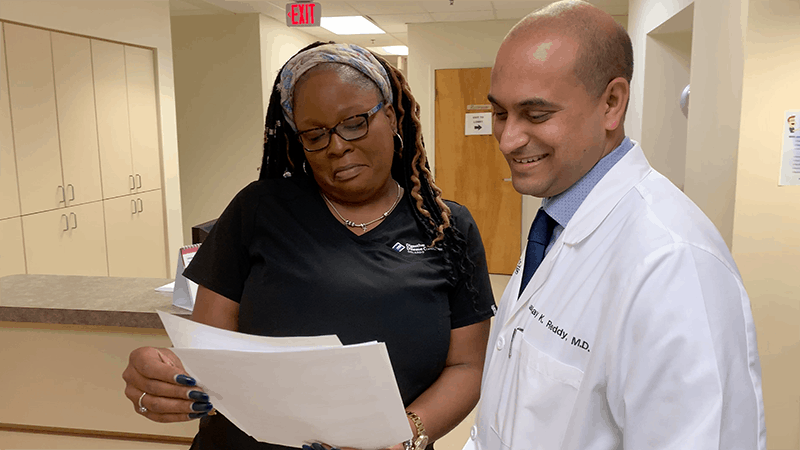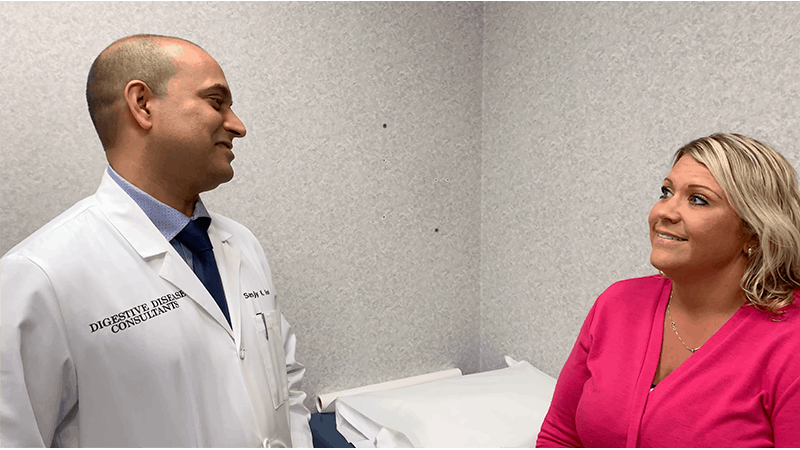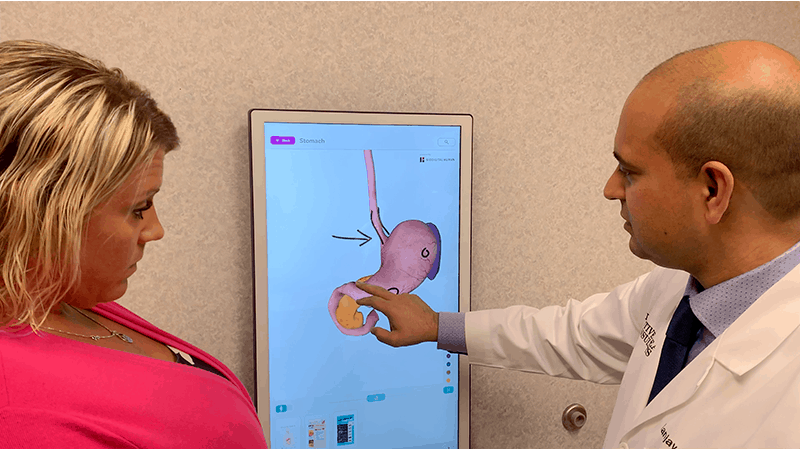If you’re in your mid-forties and have never had screening for colon cancer, it might be time to see your gastroenterologist (GI). Following its newly updated guidelines for colon and rectal cancer screening, the American Cancer Society (ACS) now recommends that adults at average risk of colorectal cancer begin regular screenings at age 45 instead of 50, as previously advised.
Sanjay K. Reddy, M.D., a board-certified gastroenterologist at Digestive Disease Consultants Orlando, serves on the Orlando Board of the American Cancer Society. Dr. Reddy says the change was informed by research from ACS scientists, who found that cancers of the colon and rectum are occurring at increasing rates among young and middle-aged adults.
“A review was recently published in the Journal of the National Cancer Institute that looked at data from over 500,000 patients born between 1890 and 1990,” says Dr. Reddy. “It was determined that unexpected changes in the incidence of colon and rectal cancer are significant and have changed the way we look at the cancer prevention landscape.”
“We recently found that among patients from age 40 to 55, the incidence of cancer has actually increased. And based on a review of the data, we now feel that age 45 is the appropriate age to start screening for colon cancer.”
Making Sense of the Data
 Colorectal cancer is the fourth most common cancer diagnosed in both men and women in the United States and the second leading cause of cancer-related deaths.
Colorectal cancer is the fourth most common cancer diagnosed in both men and women in the United States and the second leading cause of cancer-related deaths.
ACS researchers found that new cases of colon cancer and rectal cancer are occurring at an increasing rate among young and middle-aged adults. Among adults younger than 55 years, there was a 51% increase in the incidence of colorectal cancer from 1994 to 2014 and an 11% increase in mortality from 2005 to 2015.
The study found that taking age into account, people born in 1990 have double the risk of colon cancer and four times the risk of rectal cancer compared to those born around 1950 when the risk was at its lowest. Other studies have demonstrated that one in seven colon cancer patients are younger than 50.
It is important to note that the ACS recommendation to start screening at age 45 is a qualified recommendation, meaning there are definite benefits of screening at the younger age, but there is less certainty about the balance and harms, or concerning patients’ values and preferences, which could lead to different decisions about screening.
This is opposed to a strong recommendation, where the benefit is clear and almost everyone should do it (starting screening at age 50 still remains a strong recommendation from the ACS).
Other guideline-producing organizations such as the US Preventive Services Task Force (USPSTF) have not changed their recommendations for colorectal screening, which still remain at age 50 to start.
Moreover, there is as yet no evidence that insurance companies are going to cover the testing for the younger age group. Younger patients may have to pay out-of-pocket if they decide to follow the new ACS guidelines. You should check with your insurance company about their 2019 coverage decisions for screening.
Consult Your Doctor To Be Sure
 Dr. Reddy stresses the importance of consulting your physician about colorectal cancer screening whether you are having digestive problems or even if there are no prevailing health issues.
Dr. Reddy stresses the importance of consulting your physician about colorectal cancer screening whether you are having digestive problems or even if there are no prevailing health issues.
“First of all, I think it’s important to understand that if you’re having symptoms, any change in your digestive health, or any cause for concern or alarm, the most important thing is to have a conversation with your doctor,” says Dr. Reddy. “And they can advise you how to best approach that from a cancer prevention standpoint.”
“For patients who feel well, who don’t have any specific health complaints, the idea of cancer screening is very important. These recommendations were published by the American Cancer Society which has very well-established guidelines on screening methods for different types of cancers on different parts of the body.”
A primary element causing an increased incidence of colorectal cancer may be the risk factors associated with a Western lifestyle that have been shown to raise the risk of developing the disease. They include:
- Tobacco use
- Being overweight or obese
- High level of alcohol consumption
- A sedentary lifestyle
- A diet low in fruits and vegetables
- A low-fiber and high-fat diet
Types of Colorectal Cancer Screening
 Dr. Reddy says that a number of simple and pain-free screening options exist for people to ensure they are free from colorectal cancer or able to catch it early and prevent potentially fatal complications later on. Colon cancer has a 92% survival rate if detected early on.
Dr. Reddy says that a number of simple and pain-free screening options exist for people to ensure they are free from colorectal cancer or able to catch it early and prevent potentially fatal complications later on. Colon cancer has a 92% survival rate if detected early on.
“There are a variety of screening tests that apply to colorectal cancer,” says Dr. Reddy. “The most important thing is to have a conversation with your doctor. Of course, for any test or procedure, you would need to check with your insurance company as far as payment, benefits, coverage, and issues like that.”
Different screening tests are employed to detect polyps or colorectal cancer. You should consult your gastroenterologist to decide which of the following tests might be right for you.
- Stool Tests including the guaiac-based fecal occult blood test (gFOBT), the fecal immunochemical test (FIT), or the stool DNA test
- Flexible Sigmoidoscopy
- Colonoscopy
For Dr. Reddy, the new ACS screening guidelines represent good news for adults under 55 to prevent and stop colorectal cancer in its tracks. “From a medical standpoint, I’m happy to announce that the new guidelines are out, and please feel free to contact us if you have any questions or concerns, or have a conversation with your doctor,” he says.
